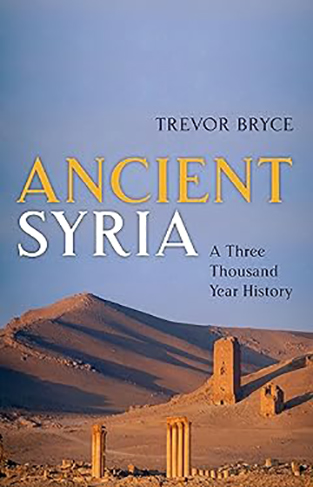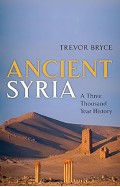Ancient Syria - A Three Thousand Year History
By: Trevor Bryce
-
Rs 12,595.00
Due to constant currency fluctuation, prices are subject to change with or without notice.
Across the centuries, from the Bronze Age to the Rome Era, we encounter a vast array of characters and civilizations, enlivening, enriching, and besmirching the annals of Syrian history: Hittite and Assyrian Great Kings; Egyptian pharaohs; Amorite robber-barons; the biblically notorious Nebuchadnezzar; Persia's Cyrus the Great and Macedon's Alexander the Great; the rulers of the Seleucid empire; and an assortment of Rome's most distinguished and most infamous emperors. All swept across the plains of Syria at some point in her long history. All contributed, in one way or another, to Syria's special, distinctive character, as they imposed themselves upon it, fought one another within it, or pillaged their way through it.
But this is not just a history of invasion and oppression. Syria had great rulers of her own, native-born Syrian luminaries, sometimes appearing as local champions who sought to liberate their lands from foreign despots, sometimes as cunning, self-seeking manipulators of squabbles between their overlords. They culminate with Zenobia, Queen of Palmyra, whose life provides a fitting grand finale to the first three millennia of Syria's recorded history. The conclusion looks forward to the Muslim conquest in the 7th century AD: in many ways the opening chapter in the equally complex and often troubled history of modern Syria.
Across the centuries, from the Bronze Age to the Rome Era, we encounter a vast array of characters and civilizations, enlivening, enriching, and besmirching the annals of Syrian history: Hittite and Assyrian Great Kings; Egyptian pharaohs; Amorite robber-barons; the biblically notorious Nebuchadnezzar; Persia's Cyrus the Great and Macedon's Alexander the Great; the rulers of the Seleucid empire; and an assortment of Rome's most distinguished and most infamous emperors. All swept across the plains of Syria at some point in her long history. All contributed, in one way or another, to Syria's special, distinctive character, as they imposed themselves upon it, fought one another within it, or pillaged their way through it.
But this is not just a history of invasion and oppression. Syria had great rulers of her own, native-born Syrian luminaries, sometimes appearing as local champions who sought to liberate their lands from foreign despots, sometimes as cunning, self-seeking manipulators of squabbles between their overlords. They culminate with Zenobia, Queen of Palmyra, whose life provides a fitting grand finale to the first three millennia of Syria's recorded history. The conclusion looks forward to the Muslim conquest in the 7th century AD: in many ways the opening chapter in the equally complex and often troubled history of modern Syria.
Ancient Syria - A Three Thousand Year History
By: Trevor Bryce
Rs 12,595.00 Ex Tax :Rs 12,595.00
Zubin Mehta: A Musical Journey (An Authorized Biography)
By: VOID - Bakhtiar K. Dadabhoy
Rs 630.00 Rs 1,050.00 Ex Tax :Rs 630.00
No similar books from this author available at the moment.
No recently viewed books available at the moment.
Zubin Mehta: A Musical Journey (An Authorized Biography)
By: VOID - Bakhtiar K. Dadabhoy
Rs 630.00 Rs 1,050.00 Ex Tax :Rs 630.00
Ancient Syria - A Three Thousand Year History
By: Trevor Bryce
Rs 12,595.00 Ex Tax :Rs 12,595.00














-120x187.jpg?q6)






-120x187.jpg?q6)






